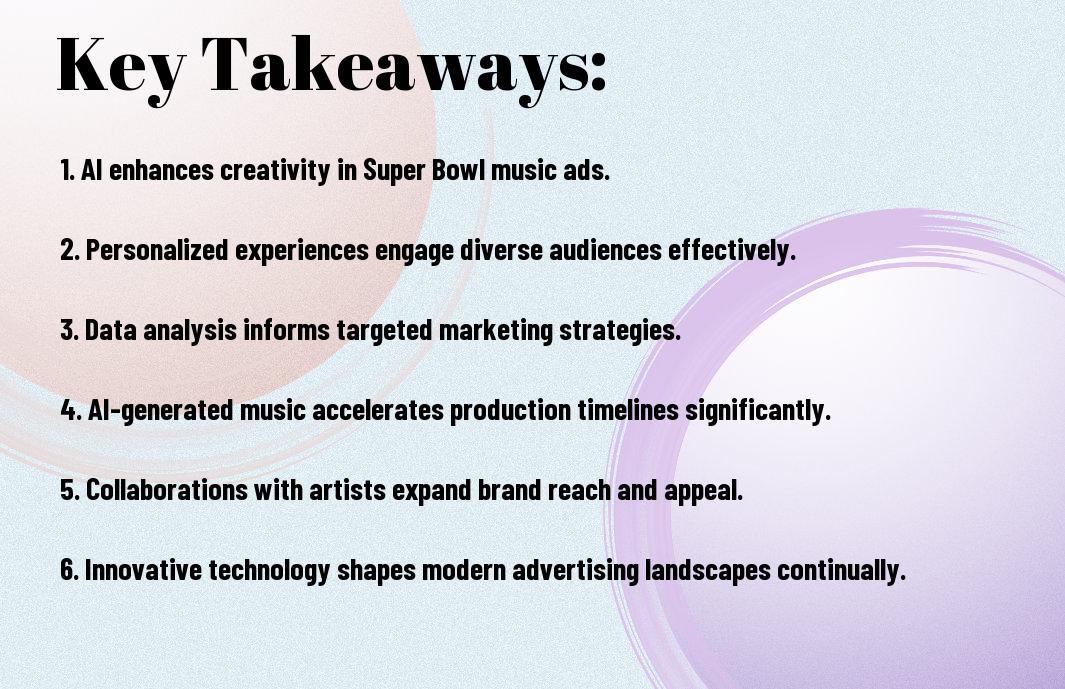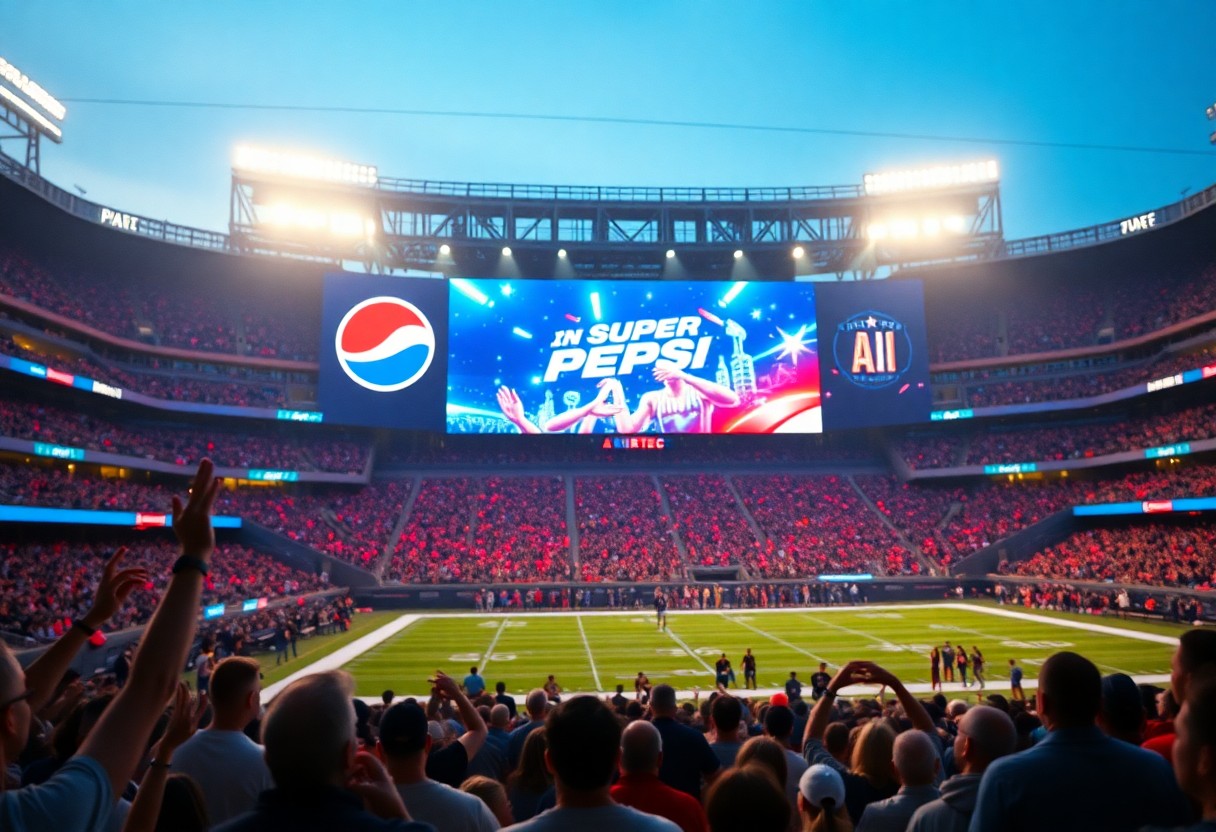There’s a fascinating intersection of technology and creativity happening in the world of advertising, particularly evident in Pepsi’s Super Bowl music ads. As I examine into this topic, I’ll explore how artificial intelligence is transforming the way brands like Pepsi craft their musical narratives during one of the biggest events in television. You’ll discover the innovative AI-driven strategies employed to capture attention, evoke emotions, and ultimately enhance viewer engagement. Join me as we unpack the evolution of these ads and the role AI plays in shaping your viewing experience.
The Role of AI in Advertising
For advertisers like Pepsi, leveraging AI technology revolutionizes how campaigns are crafted and executed. By harnessing data analytics and machine learning, brands can gain deeper insights into consumer behavior, ultimately driving engagement and boosting conversion rates. The integration of AI in advertising not only streamlines processes but also enhances creativity, enabling brands to connect with their audiences on a more personal level.
AI Algorithms and Targeting
Before initiateing on ad campaigns, brands utilize AI algorithms to determine the most effective targeting strategies. These algorithms analyze vast amounts of consumer data, allowing you to pinpoint specific demographics and psychographics that are most likely to engage. This precision helps ensure that your ads reach not just a broad audience but the right audience, maximizing impact.
Personalization in Music Selection
For impactful advertising, the personalization of music selection plays a key role. Music can evoke emotions and nostalgia, making it a powerful tool in advertising. By employing AI, I can analyze listener preferences and trends to choose the right tracks that resonate with your target audience, enhancing the overall effectiveness of the campaign.
Personalization goes beyond simple data analysis; it taps into the emotional connection that music creates. By understanding your audience’s preferences and incorporating popular tracks or emerging artists, I can craft a memorable soundtrack that aligns with your brand message. This tailored approach not only captivates your audience but also reinforces brand loyalty by creating a shared musical experience that feels relevant and relatable.
Case Study: Pepsi’s Super Bowl Ads
Some of the most captivating ads during Super Bowl events have been from Pepsi, showcasing their commitment to innovation and entertainment. Their use of high-profile celebrities paired with cutting-edge technology has kept audiences engaged. You can explore more on this fascinating blend of marketing and AI in the article If you want to know who will win the AI wars, just watch ….
Overview of Pepsi’s Advertising Strategy
At the heart of Pepsi’s advertising strategy lies a focus on creating memorable experiences that resonate with consumers. By leveraging the excitement of live sports, particularly the Super Bowl, Pepsi captures a vast audience while promoting its brand. Through clever storytelling and engaging visuals, they aim to connect with fans on a deeper level, effectively blending entertainment with brand messaging.
Integration of AI in Campaigns
Overview, integrating AI into their campaigns allows Pepsi to enhance consumer engagement and personalize advertising efforts. By utilizing AI analytics, they can identify trends and consumer preferences, making their messaging more relevant. This strategic approach enables Pepsi to remain agile and adapt to changing market dynamics.
For instance, using machine learning algorithms, Pepsi can analyze social media interactions and tailor its content accordingly. This allows for real-time adjustments in campaigns, ensuring that the advertisements resonate with the target audience. Furthermore, AI tools help in creating dynamic ads that can evolve based on viewer feedback, providing a more immersive experience that aligns perfectly with their brand identity.
Impact on Audience Engagement
Despite the traditional separation between advertising and consumer experience, Pepsi’s innovative use of AI in its Super Bowl music ads has transformed audience engagement. By personalizing content and creating unique, interactive experiences, Pepsi has effectively drawn viewers into the narrative, making them feel more connected to the brand. This not only increases brand loyalty but also encourages viewers to share their experiences on social media platforms, amplifying the reach of the campaign.
Metrics of Success
By analyzing viewer interactions, engagement rates, and social media shares, Pepsi has been able to measure the effectiveness of their AI-driven advertising. These metrics help determine the campaign’s impact, driving future strategies and ensuring the company stays ahead in connecting with its audience. Understanding these metrics allows you to appreciate how technology can enhance marketing efforts.
Consumer Reactions
Before the ads aired, anticipation built around how AI would elevate the musical experience. Viewers were not just passive observers; they actively engaged with the advertisements, providing real-time feedback through social media platforms.
It is fascinating to see how consumer reactions to Pepsi’s AI-infused ads have shifted the landscape of advertising. Many viewers expressed excitement about the personalized music experiences and appreciated the innovative approach. The blend of catchy tunes with interactive elements encouraged sharing and discussions online, creating a community around the ads. This feedback loop allows me to feel the pulse of the audience, shaping future campaigns to better resonate with consumer desires and preferences. By leveraging these insights, brands can create even more engaging experiences that align with their audience’s expectations.
Future Trends in AI and Advertising
Once again, we find ourselves at the intersection of technology and creativity, where artificial intelligence is poised to redefine the landscape of advertising. As AI continues to evolve, I anticipate a future where brands like Pepsi utilize intelligent algorithms to create personalized experiences that resonate deeply with audiences. This shift will not only create more engaging content but also optimize ad placements based on real-time consumer behavior, ultimately enhancing efficiency and effectiveness in marketing strategies.
Evolving Technologies
At the forefront of this transformation are emerging technologies such as generative AI and machine learning. These innovations enable brands to produce unique content tailored to target individuals, increasing relevance and engagement. As I observe these developments, I’m excited to see how they will shape consumer interactions and the overall storytelling in advertisements, leading to more immersive experiences.
Predictions for Upcoming Campaigns
By analyzing current trends, I foresee an increase in AI-driven campaigns that leverage predictive analytics to anticipate consumer preferences. Brands will not only personalize their messaging but also innovate in the way they engage with audiences, using data to shape narratives that resonate on a deeper level.
Consequently, I believe that future campaigns will employ advanced algorithms to analyze audience emotion and engagement in real-time, allowing brands to adapt their strategies dynamically. This adaptability will lead to campaigns that feel more intuitive and connected to the consumer’s journey, making them more effective and memorable. By embracing these trends, brands like Pepsi will continue to lead the charge in the exciting realm of AI-driven advertising, ensuring that they remain relevant and impactful in an increasingly competitive landscape.
Ethical Considerations
Not all innovations in AI come without concerns, particularly in the context of Pepsi’s Super Bowl music ads. The blend of creativity and technology prompts a deeper examination of ethical implications. As advertisers harness AI’s capabilities, we must consider how these advancements affect consumer sentiments and societal norms. Ensuring that AI enhances experiences without crossing moral lines should be our priority.
Data Privacy and Consumer Trust
The growing integration of AI in advertising raises significant questions about data privacy and consumer trust. By utilizing consumer data to create personalized music ads, brands like Pepsi must navigate the fine line between enhancing consumer experience and protecting individual privacy. It is vital that companies prioritize transparency and security in their data handling practices to safeguard consumer trust.
Transparency in AI Usage
An important aspect of ethical AI deployment involves transparency regarding how AI is utilized in advertising. Consumers have a right to understand when and how their information is being processed to create targeted experiences. Brands that openly communicate their AI practices are more likely to foster trust and loyalty among consumers.
Considering this, I believe that transparency is vital for brands, not only to avoid backlash but also to build lasting relationships with consumers. When you know how your data is being used, it enhances your experience and reflects positively on the brand. Pepsi, by being open about their AI utilization in crafting music ads, can reinforce consumer confidence and set a benchmark for ethical advertising in the industry.
Challenges and Limitations
Now, while AI has revolutionized Pepsi’s Super Bowl music ads, there are inherent challenges and limitations that cannot be overlooked. The integration of AI requires a balance of creativity and algorithmic precision, which can sometimes lead to compromises in the authenticity and emotional resonance of the ads. Understanding these challenges helps us grasp the complete picture of AI’s role in marketing.
Technical Constraints
One major hurdle in using AI for music in advertisements is the technical constraints associated with the algorithms. The capabilities of AI models can vary significantly, often limiting the complexity and depth of musical compositions that can be generated. As a result, the final product might not fully capture the desired emotional impact or brand messaging.
Market Reception
Constraints in AI application extend beyond technical challenges; market reception plays a significant role as well. As I analyze consumer perceptions, it’s evident that while some audiences embrace AI-generated content, others remain skeptical. The authenticity in music and emotional connection can often be questioned, leading to mixed reviews about the overall effectiveness of these ads in resonating with viewers.
It is imperative to recognize that consumer sentiment varies widely. Some viewers may appreciate innovation and the futuristic aspect of AI music, while others may feel a disconnect, preferring human creativity. This dichotomy illustrates that even with cutting-edge technology, understanding your audience’s preferences is fundamental. Thus, navigating market reception becomes a delicate balancing act for brands like Pepsi, as they strive to harmonize AI innovations with consumer expectations.
Conclusion
The integration of AI in Pepsi’s Super Bowl music ads marks a significant evolution in advertising strategies. I have observed how this technology can enhance creativity and engagement, allowing brands to connect with audiences in innovative ways. By leveraging AI, you can create personalized experiences that resonate more deeply with consumers. As we continue to see advancements in AI, it’s clear that this will play a pivotal role in shaping the future of advertising and how you choose to engage with your audience.











